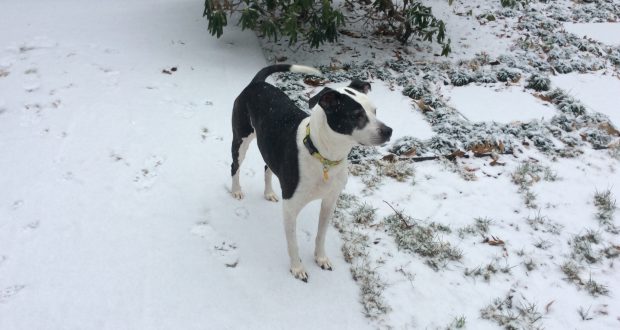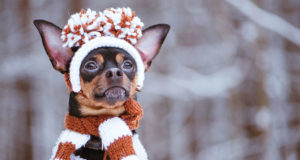Notwithstanding their fur coats, pets can feel the cold just as humans do. So it’s up to you to ensure that your furry friends stay safe and warm during the colder months.
To help, the Outdoor Power Equipment Institute (OPEI), the international trade association representing more than 100 power equipment, engine and utility vehicle manufacturers and suppliers, offers these tips:
• Know your pet. Different pets have different levels of tolerance for cold. When going out for walks, a short-coated, elderly or frail dog may need a jacket to weather the elements.
• Forgo haircuts. Let your dog’s winter coat protect him against the chill. Save shearing for warmer months.
• Check ears, paws and tails regularly. You’re looking for signs of frostbite or raw spots from ice and snow. Remove any clumps of frozen debris from between the paw pads each time your dog goes outside.
• Wipe down your pet’s belly, legs and paws. Have a clean towel ready each time your dog comes inside to remove ice-melting chemicals, which can irritate and cause serious illness if licked or swallowed.
• Clean up antifreeze spills. Due to the sweet smell and taste, pets will lick or drink antifreeze if they find it puddled on sidewalks or garage floors—but antifreeze is toxic to cats and dogs. Clean up spills and consider using a brand made from propylene glycol, which is less toxic.
• Keep the water flowing. Dry winter weather can be dehydrating, as well as freezing. Keep a fresh supply of water inside for your pet and break up any ice accumulation on her outdoor water bowl.
• Provide a warm place to rest. Winter days can be drafty and cold, so ensure your pet has plenty of elevated places inside to warm up. A cozy pet bed works beautifully.
• Leave Fido at home. You’ve probably heard a lot about the dangers of leaving a pet in a hot car during the summertime, but the practice can be just as hazardous in the winter. It’s always best to leave your dog at home when you’re running errands.
• Keep them leashed. More pets get lost during the winter than any other time of the year. Snow covers familiar scents, making it harder for your dog to find his way home. Keep your dog on a leash when you’re out and about and make sure his tag and microchip information are up-to-date in case he escapes.
“Our TurfMutt environmental education stewardship program encourages people and pets to get outside, and my dog Lucky loves to romp in fresh snow as much as the next dog,” said Kris Kiser, president and CEO of OPEI. “But during the wintertime we have to be careful about when and how we expose our pets to the elements. Even though pets must go outdoors periodically to do their ‘business’ and get some exercise, no pet should be left outdoors during the winter months—if it’s too cold for you, it’s too cold for your pet.”
Learn More
For further information about the benefits of your family lawn for pets and people during all seasons, go to www.SaveLivingLandscapes.com and www.TurfMutt.com.
 Dog Living A lifestyle magazine for dog lovers
Dog Living A lifestyle magazine for dog lovers





